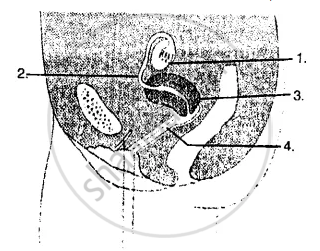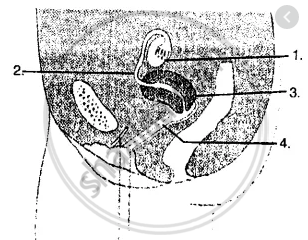Advertisements
Chapters
![Selina solutions for Concise Biology [English] Class 8 ICSE chapter 3 - Reproduction in Humans Selina solutions for Concise Biology [English] Class 8 ICSE chapter 3 - Reproduction in Humans - Shaalaa.com](/images/concise-biology-english-class-8-icse_6:15d81ba668d34874ab02bab43c610c10.jpg)
Advertisements
Solutions for Chapter 3: Reproduction in Humans
Below listed, you can find solutions for Chapter 3 of CISCE Selina for Concise Biology [English] Class 8 ICSE.
Selina solutions for Concise Biology [English] Class 8 ICSE 3 Reproduction in Humans Multiple Choice Question [Pages 30 - 31]
Put a tick mark (✓) against the correct alternative in the following statement:
The testes are located within the:
Penis
Scrotum
Ureter
Urinary bladder
Put a tick mark (✓) against the correct alternative in the following statement:
Amoeba is most commonly reproduced by:
Budding
Regeneration
Binary fission
Multiple fission
Put a tick mark (✓) against the correct alternative in the following statement:
Identify the stage which is formed after the fertilisation of the egg by the sperm?
Ovule
Foetus
Embryo
Zygote
Put a tick mark (✓) against the correct alternative in the following statement:
Internally, the uterus opens into:
Urethra
Vagina
Oviduct
Vulva
Selina solutions for Concise Biology [English] Class 8 ICSE 3 Reproduction in Humans Short Answer Question [Pages 31 - 32]
Distinguish between the following pair of terms:
Egg and sperm.
Distinguish between the following pair of terms:
Sexual reproduction and asexual reproduction.
Distinguish between the following pair of terms:
Budding and Regeneration.
Define the term Fetilization.
Define the term Implantation.
State the reason why testes lie outside the abdomen in a scrotum?
Why is it important that a very large number of sperms should be present in the semen ?
List the structures, in their correct sequence, through which the sperms must pass from the time they are produced in the testes to the time they leave the urethra.
State the function of Ovary.
State the function of Testes.
State the function of Fallopian tubes.
State the function of Seminal vesicle.
What is the function of uterus?
Given here is a section of the female reproductive system of human beings.

Name the parts labelled 1 to 4
Given here is a section of the female reproductive system of human beings.

Name the part where fertilisation occurs in human beings.
Given alongside is a diagram of male reproductive system in humans. Label the parts indicated by numbers 1 to 5, and state their functions.

Selina solutions for Concise Biology [English] Class 8 ICSE 3 Reproduction in Humans Long Answer Question [Page 32]
How does a single called fertilized egg grows into an adult human body?
Describe the human female reproductive system with a labelled diagram.
Solutions for 3: Reproduction in Humans
![Selina solutions for Concise Biology [English] Class 8 ICSE chapter 3 - Reproduction in Humans Selina solutions for Concise Biology [English] Class 8 ICSE chapter 3 - Reproduction in Humans - Shaalaa.com](/images/concise-biology-english-class-8-icse_6:15d81ba668d34874ab02bab43c610c10.jpg)
Selina solutions for Concise Biology [English] Class 8 ICSE chapter 3 - Reproduction in Humans
Shaalaa.com has the CISCE Mathematics Concise Biology [English] Class 8 ICSE CISCE solutions in a manner that help students grasp basic concepts better and faster. The detailed, step-by-step solutions will help you understand the concepts better and clarify any confusion. Selina solutions for Mathematics Concise Biology [English] Class 8 ICSE CISCE 3 (Reproduction in Humans) include all questions with answers and detailed explanations. This will clear students' doubts about questions and improve their application skills while preparing for board exams.
Further, we at Shaalaa.com provide such solutions so students can prepare for written exams. Selina textbook solutions can be a core help for self-study and provide excellent self-help guidance for students.
Concepts covered in Concise Biology [English] Class 8 ICSE chapter 3 Reproduction in Humans are Reproduction, Mode of Reproduction in Animal, Asexual Reproduction in Animal, The Female Reproductive System, The Male Reproductive System, Fertilization in Human, Implantation in Human, Sexual Reproduction in Animals, Pregnancy in Humans, Placenta (Growth) in Human, Parturition (Birth) in Human.
Using Selina Concise Biology [English] Class 8 ICSE solutions Reproduction in Humans exercise by students is an easy way to prepare for the exams, as they involve solutions arranged chapter-wise and also page-wise. The questions involved in Selina Solutions are essential questions that can be asked in the final exam. Maximum CISCE Concise Biology [English] Class 8 ICSE students prefer Selina Textbook Solutions to score more in exams.
Get the free view of Chapter 3, Reproduction in Humans Concise Biology [English] Class 8 ICSE additional questions for Mathematics Concise Biology [English] Class 8 ICSE CISCE, and you can use Shaalaa.com to keep it handy for your exam preparation.
